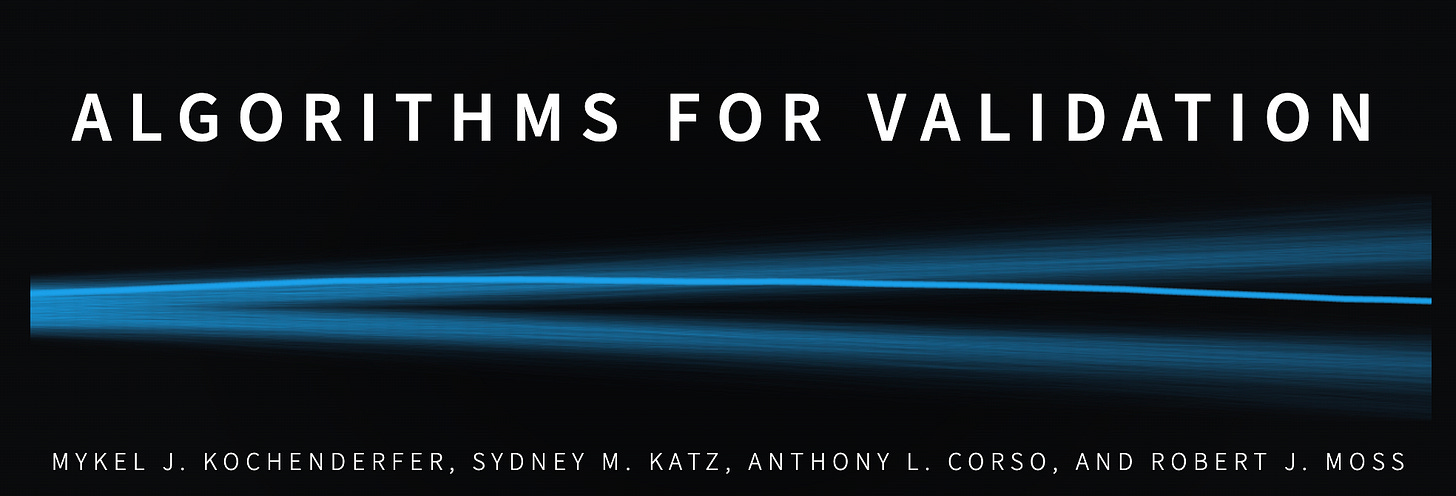Google's A2A Protocol, New Courses from Stanford and Microsoft, Algorithms for Validation Book
This week's agenda:
Open Source of the Week - Google's A2A protocol
New learning resources - Validation of safety-critical systems, building LLM from scratch, AI agents and courses, Docker Model Runner demo
Book of the week - Algorithms for Validation by Mykel J. Kochenderfer, Sydney M. Katz, Anthony L. Corso, and Robert J. Moss
I share daily updates on Facebook, Telegram, WhatsApp, and Viber.
Open Source of the Week
Google announced this week the Agent to Agent (aka Agent2Agent or A2A) protocol - an open protocol enabling communication and interoperability between opaque agentic applications.
The A2A protocol enables cross-collaboration between different agents regardless of their framework, and it includes the following functionality:
Seamless Agent Collaboration: Introduces a standard protocol for autonomous, opaque agents built on different frameworks and by various vendors to communicate and collaborate effectively with each other and with users, addressing the current lack of agent interoperability.
Simplifies Enterprise Agent Integration: Provides a straightforward way to integrate intelligent agents into existing enterprise applications, allowing businesses to leverage agent capabilities across their technology landscape.
Supports Key Enterprise Requirements: Offers core functionalities essential for secure, enterprise-grade agent ecosystems, including capability discovery, user experience negotiation, task and state management, and secure collaboration.
The following diagram provides a contextual architecture of multiple agent systems with A2A protocol:
The following video provides a short example of connecting different agent frameworks with the A2A protocol. More details are available on the following links:
Project documentation: https://google.github.io/A2A/
Project GitHub: https://github.com/google/A2A
License: Apache 2.0
New Learning Resources
Here are some new learning resources that I came across this week.
Validation of Saftery Critical Systems Course
Stanford University released a new course - 𝐕𝐚𝐥𝐢𝐝𝐚𝐭𝐢𝐨𝐧 𝐨𝐟 𝐒𝐚𝐟𝐞𝐭𝐲 𝐂𝐫𝐢𝐭𝐢𝐜𝐚𝐥 𝐒𝐲𝐬𝐭𝐞𝐦𝐬, focusing on the validation methods of autonomous decision-making systems. The course, by 𝐒𝐲𝐝𝐧𝐞𝐲 𝐌. 𝐊𝐚𝐭𝐳, provides a variety of mathematical algorithms and frameworks to validate autonomous systems' performance in simulation, and it covers the following topics:
Setting up validation problems using topics from model fitting, model validation, and property specification
sampling-based validation techniques for tasks such as falsification and probability of failure estimation
Overview of formal methods for tasks such as reachability analysis
Prerequisites: basic probability theory, multivariable calculus, and fluency in a high-level programming language.
𝐓𝐞𝐱𝐭𝐛𝐨𝐨𝐤: The course is based on the book Algorithms for Validation, which is available online for free (see the book of the week section).
Build LLM from Scratch
This is a new course from Sebastian Raschka that focuses on the foundation of LLM. The course covers topics such as:
Working with text data
Coding attention mechanisms
Building a GPT model alike from scratch
Pretraining model using unlabeled data
AI Agents Course
AI Agents for Beginners is a new crash course by Microsoft developers that focuses on AI agents. This 10-lesson course by Koery Stegared-Pace covers the foundation of AI agents, and as the name implies, it is a beginner-level course. The course covers the following topics:
Multi-AI agent system
Agentic Rag
AI agents in production
AI agents design
Docker Model Runner Demo
The following tutorial by Abhishek Veeramalla provides an introduction to the Docker Model Runner. The Model Runner enables the local running of LLMs with Docker Desktop.
Book of the Week
This week's focus is on the 𝐕𝐚𝐥𝐢𝐝𝐚𝐭𝐢𝐨𝐧 𝐨𝐟 𝐒𝐚𝐟𝐞𝐭𝐲 𝐂𝐫𝐢𝐭𝐢𝐜𝐚𝐥 𝐒𝐲𝐬𝐭𝐞𝐦𝐬 course textbook - Algorithms for Validation by Mykel J. Kochenderfer, Sydney M. Katz, Anthony L. Corso, and Robert J. Moss. In line with the course syllabus, the book provides an introduction to algorithms for validation safety-critical systems, which includes the following topics:
Introduction to validation algorithms
System modeling
Optimization and planning of falsification
Failure distribution and probability estimate
Reachability of linear and non-linear systems
Explainability and monitoring
This book is part of a sequence that includes Algorithms for Decision Making and Algorithms for Optimization.
Currently, the book has only an online version that is available for free:
https://algorithmsbook.com/validation/
A printed version of the book will be available in the near future. More details are available on the book's website.
Have any questions? Please comment below!
See you next Saturday!
Thanks,
Rami




